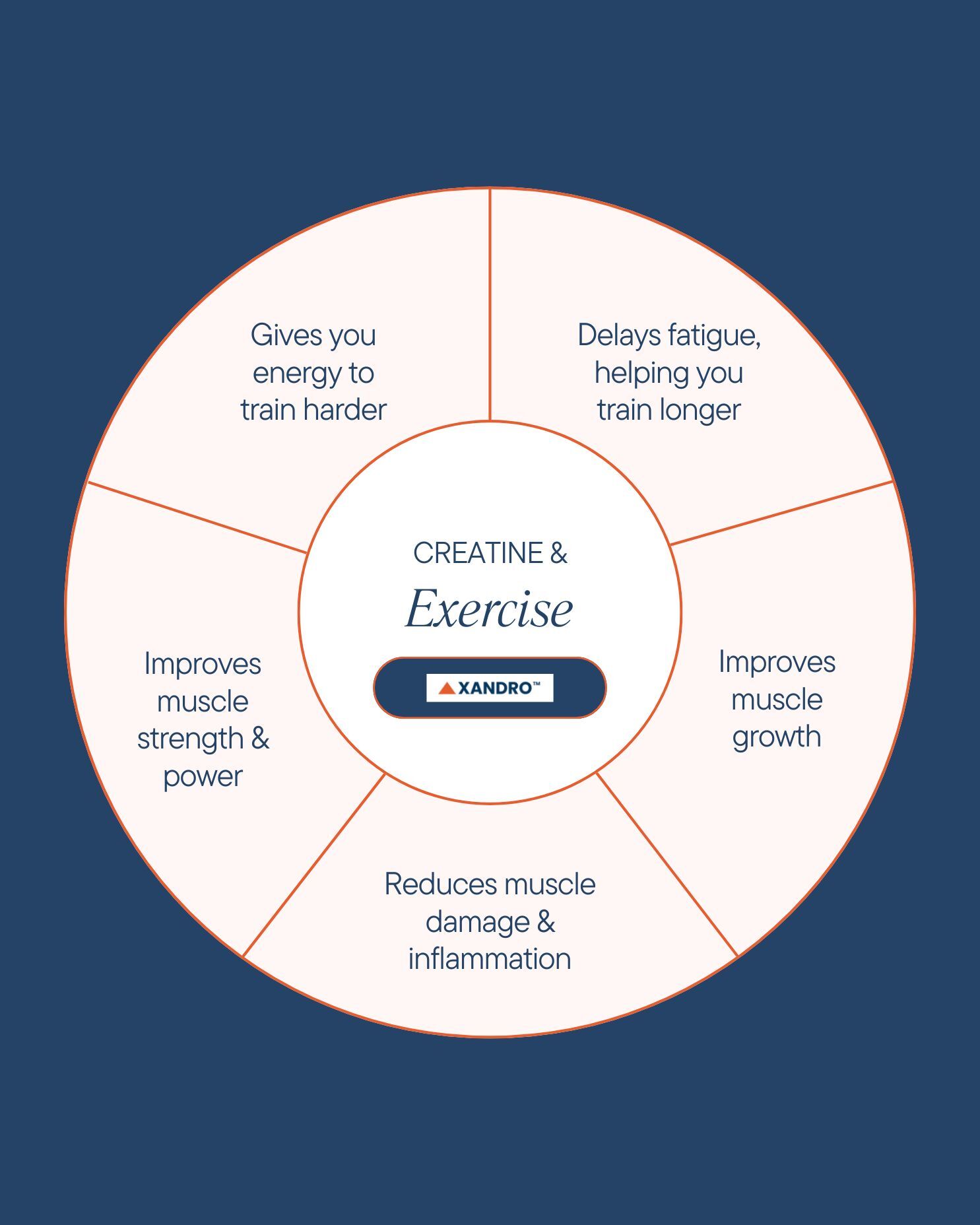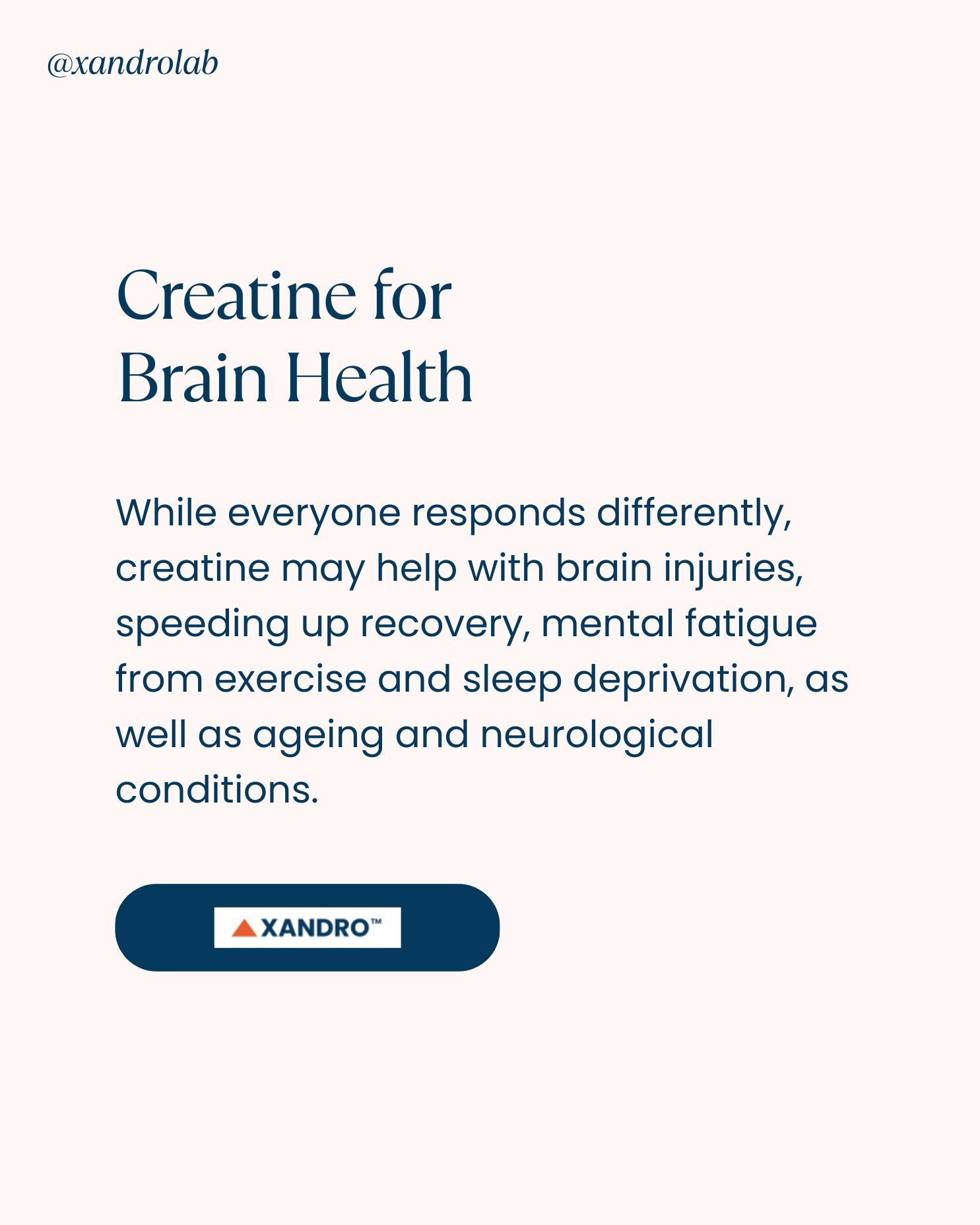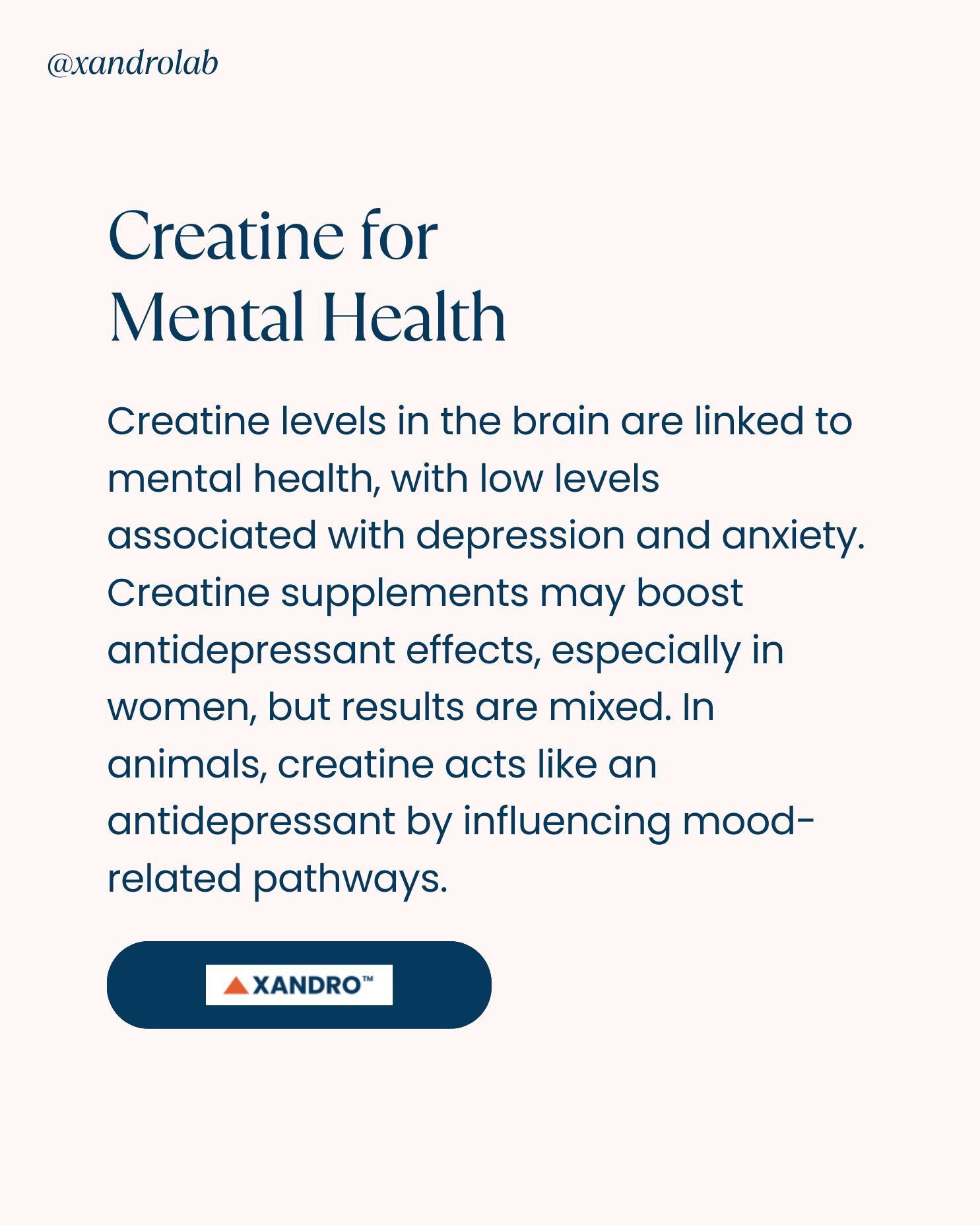Creatine for Strength, Brain Health & Longevity: A Scientific Analysis
11th Apr 2025
Creatine for Brain & Body: Can It Boost Cognition, Clear Brain Fog & Extend Longevity?
Creatine isn’t just for gym-goers and athletes. Research shows it may also boost brain function, support mental clarity and even help with longevity. Whether you’re looking to improve your workouts, sharpen your mind or stay strong as you age, creatine could be a game-changer.
Let’s go over what the research says.
Products mentioned in this blog:
How Creatine Improves Strength & Muscle Growth
Creatine monohydrate is one of the most researched supplements for improving strength and power, faster muscle growth and better exercise performance in short, intense workouts (like weightlifting or sprinting).
It’s been found to do this through a number of ways.
- Increases ATP production: Creatine helps regenerate ATP (your muscles' energy currency), allowing you to train harder and longer.
- Delays fatigue: By topping up phosphocreatine stores, it helps you push through extra reps and recover faster between sets.
- Builds lean muscle: Studies show creatine improves muscle growth, especially when combined with resistance training.
- Speeds up recovery: Reduces muscle damage and inflammation after intense workouts.
Your muscles store creatine as phosphocreatine (PCr), which helps produce quick energy during heavy lifting or sprinting. Supplementing increases muscle creatine by around 20 per cent on average, with some people seeing up to 40 per cent.
Taking creatine with carbs, about 3 to 5g per day, protein or insulin (like after a meal) helps muscles absorb more, with exercise also boosting uptake.

The Best Creatine for Sports Performance
- Creatine monohydrate (3–5g per day) is the gold standard because it’s cheap, effective and is backed by decades of research.
- Take it post-workout (with carbs/protein for better absorption) or any time of day — timing isn’t critical.
Further Reading: How Beneficial is Creatine for Someone Who Doesn’t Work Out?
Can Creatine Improve Brain Function?
Your brain is an energy-hungry organ and creatine plays a key role in keeping it fuelled. Some creatine brain benefits include:
- Improves Memory & Focus: Studies show creatine improves working memory, especially in vegetarians (who get less from diet) and older adults. As for creatine brain fog benefits, it may clear brain fog by supporting mental energy and dopamine levels.
- Protects Against Mental Fatigue: Helps combat tiredness during sleep deprivation or high-stress periods. One study found creatine reduced mental fatigue by 50 per cent in sleep-deprived individuals.
- May Support Brain Repair: Early research suggests creatine could help with recovery after concussions or brain injuries. In children with severe TBI, creatine shortened recovery time and improved cognitive function.
Creatine for Brain Health
When taking creating, brain creatine levels go up, but not as much as in muscles (typically 3 to 10 per cent, vs. 20 per cent + in muscle).
This difference is because the brain makes its own creatine, so it doesn’t rely as much on supplements. Also, some brain cells may not absorb extra creatine efficiently.
When does creatine help in the brain?
- Brain injuries (like concussions): may speed up recovery.
- Mental fatigue (e.g., sleep deprivation, intense exercise).
- Ageing & neurological conditions (early research suggests possible benefits for memory and cognitive decline).
Just know that not everyone responds the same way to creatine and that the best dose for brain benefits isn’t fully clear yet.
Best Time to Take Creatine for Brain Health
- As for how to use creatine for brain health, daily dosing (5g) works best for long-term brain benefits.
- For acute mental fatigue, try 10g before/during high-stress tasks.
- How much creatine for brain health? The best creatine for brain health dosage is 5 to 10g per day, but higher doses may be needed for acute stress like sleep loss. Take it daily, as its brain benefits build up over time.
Further Reading: Does Creatine Impact Sleep?
GAA (Glycocyamine) – A Potential Alternative?
GAA is a natural creatine precursor, meaning that your body uses it to make creatine. Some studies suggest it might increase brain creatine better than creatine itself.
Its potential benefits include boosting brain energy, as it may help with memory and mental performance. It could also help in conditions like chronic fatigue or age-related cognitive decline.
High doses in animal studies, however, have raised red flags (like affecting brain chemistry), but human trials use much smaller amounts. More research needed to confirm long-term safety and effectiveness, so stick with creatine unless future research confirms GAA’s benefits.
Further Reading: Muscles and Longevity
Creatine Cognitive Function
The strongest evidence for creatine’s brain benefits comes from people with creatine deficiency syndromes — a rare condition where the brain can’t make or store enough creatine. These individuals often suffer from developmental delays, seizures and learning difficulties, but creatine supplementation can reverse or lessen these symptoms.
In healthy people, the creatine for brain function research is mixed:
- Some studies show creatine improves memory, reaction time and complex thinking, especially in vegetarians (who get less creatine from diet) and older adults.
- Others find no clear cognitive benefits in children, young adults, or seniors.
- The biggest improvements seem to happen when the brain is stressed — like during sleep deprivation. In two studies, creatine helped people think faster and stay balanced after missing a night’s sleep when combined with mild to moderate exercise.
Creatine might sharpen your mind, but the effects are most noticeable when your brain is under pressure — like when you’re exhausted or low on energy.
Creatine and Neurodegenerative Diseases
Since creatine plays a key role in brain energy, researchers have studied whether it could slow down diseases like ALS, Parkinson’s and Huntington’s. So far, the results are promising but inconsistent.
- Amyotrophic Lateral Sclerosis (ALS): Some early studies showed reduced fatigue and better physical function, but later trials in advanced ALS patients found no benefit.
- Duchenne Muscular Dystrophy (DMD): Creatine improves strength and endurance in some patients. May also help preserve bone density in those who can still walk.
- Huntington’s Disease: Early studies suggested creatine might slow progression, but larger trials (using 40g/day for 2 years) found no meaningful effect.
- Multiple Sclerosis (MS): No clear benefit — creatine didn’t improve muscle strength or exercise capacity in MS patients.
- Parkinson’s Disease: Animal studies show creatine may protect brain cells, but human trials are mixed. One study found a better response to Parkinson’s meds and slowed symptom progression after a year, but longer follow-ups showed no lasting difference vs. placebo.
While creatine might help some muscle-related conditions (like DMD), it doesn’t seem to stop or reverse neurodegenerative diseases. More research is needed to figure out the best dosing and who might benefit most.
Creatine and Mental Health
Mental health disorders like depression and anxiety affect millions of people, with about 1 in 4 Americans dealing with them each year. Traditional treatments — like therapy and medications — don’t work for everyone, leading scientists to explore alternative options, which is where creatine comes in.
Research shows that low creatine levels in the brain are linked to depression and anxiety, and in rare cases of creatine deficiency syndromes, supplementation can reverse severe cognitive and developmental problems. This has sparked interest in whether creatine could help with more common mental health issues.
Creatine for Depression
Studies find that people with depression often have lower creatine levels in certain brain areas, like the prefrontal cortex. In mice, creatine acts like an antidepressant, especially in females. It may work by activating pathways linked to mood regulation, similar to some antidepressant drugs.
As for humans, small studies (mostly in women) suggest creatine enhances the effects of antidepressants, helping improve symptoms faster, however, not all studies show benefits, so more research is needed.
So, creatine might help with depression, especially when combined with traditional treatments, but it’s not a standalone cure yet.
Creatine for Anxiety and PTSD
It’s been found that people with generalised anxiety disorder (GAD) and PTSD sometimes have lower brain creatine levels, possibly due to past trauma.
A few case studies also show creatine improved PTSD symptoms, like sleep and mood, in people who didn’t respond well to standard medications.
The thing is, there’s almost no large-scale research on creatine for anxiety or PTSD, so we can’t say for sure if it helps. Overall, creatine for these issues are promising, but it’s too early to recommend. More studies are needed.
Further Reading: Magnesium’s Benefits on Anxiety
Creatine for Concussions & Brain Injuries
After a concussion or mild traumatic brain injury (mTBI), the brain goes into an energy crisis — first burning too much fuel, then crashing into a low-energy state. Since creatine helps maintain brain energy, researchers think creatine brain repair benefits could help with recovery.
In children and adolescents with severe TBI, a small study found creatine shortened recovery time, improved cognition and reduced headaches/dizziness.
As for creating brain damage benefits, rats given creatine before or after brain injury had less brain damage, possibly because it protects mitochondria (the energy powerhouses of cells). Creatine may reduce harmful glutamate overload, prevent oxidative stress and keep ATP levels stable after injury.
This shows that early evidence is very promising, especially for preventing damage if taken before high-risk activities (like contact sports). But human trials are still limited.
Does Creatine Improve Longevity?
While creatine isn’t a ‘fountain of youth’ pill, it may help slow age-related decline by:
- Preserving muscle mass: Sarcopenia (muscle loss with age) is a major longevity risk factor.
- Supporting bone health: May reduce bone breakdown when paired with resistance training.
- Protecting brain function: Could help delay cognitive decline in ageing adults.
How Much Creatine for Longevity?
- 3–5g daily is enough for most people.
- Older adults may benefit from 5–10g to combat muscle and brain ageing.
Further Reading: All About Longevity and Longevity Supplements
Potential Creatine Side Effects & Safety
Creatine is one of the safest supplements, but some people report:
- Bloating (if taken in large doses without enough water).
- Mild stomach upset (try splitting doses or taking with food).
Creatine has not been found to cause kidney damage in healthy individuals.
End Note
For general brain health, creatine might help with memory and focus, especially if you’re sleep-deprived, older or vegetarian, but for serious brain diseases, the evidence is weak, so don’t expect miracles, but it’s still being studied. It may boost antidepressant effects, especially in women and may help with recovery and prevention of brain injuries, but, as always, more studies are needed.
If you want better workouts and possibly a slight mental edge, creatine is worth trying. For serious neurological conditions, talk to your doctor. It’s not a cure, but it might support other treatments.
To help with muscle support, alongside creatine, consider taking magnesium glycinate. It also helps support your sleep and your nervous system, not to mention it is highly absorbable!
Products mentioned in this blog:


